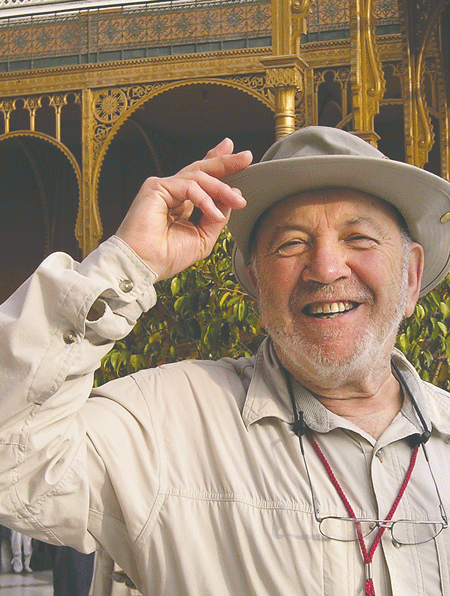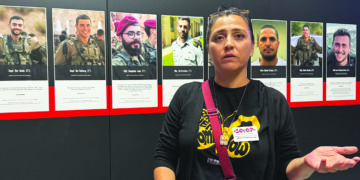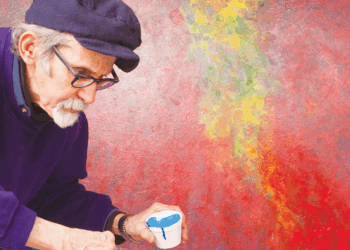By MORDECAI SPECKTOR
At Ken Tilsen’s funeral on Sept. 4 at Temple of Aaron Cemetery in Roseville, a large crowd heard songs, prayers and eulogies from close family members. Older brother Bob Tilsen noted that Ken’s Hebrew name was Akiva, after the famed Rabbi Akiva, who was steadfast in his defense of Judaism against the Roman conquerors of two millennia ago.
Grandson Nick Tilsen, who lives in Porcupine, on the Pine Ridge reservation (South Dakota), chanted a prayer in Lakota, followed by sharp blasts on a whistle fashioned from an eagle leg bone.
Remembrance
Nick said that he wondered if his grandfather, who had done so much on behalf of Indians over the years, had ever been given an Indian name. He said that he loaded his ceremonial pipe, smoked and prayed, and came up with a name: Oyate Nawicakicijin — Defends/Stands Up for People.
“Today I am burying not just my grandfather,” said Nick Tilsen, in his extemporaneous eulogy from the heart. “He was my hero.”
The eclectic funeral service for Tilsen — including a Lakota prayer by the Braveheart Singers, whose song was accompanied by hand drums; and concluding with the singing of El Malei Rachamim and chanting of Kaddish — was fitting for a unique individual, a champion of the underdog whose life exemplified commitment to social justice causes.
Tilsen died Sept. 1, at his home in Hudson, Wisc., following a lengthy illness. He died in the presence of his loving companion, Connie Goldman, and his son, Mark Tilsen. He was 85.

Tilsen was born in New Leipzig, N.D., in 1927. His family moved to Michigan for a brief time, before settling in St. Paul’s Selby-Dale neighborhood. Tilsen attended Marshall High School. After serving in the U.S. Navy aboard the USS Raymond, a destroyer escort, he enrolled in the University of Minnesota Law School and graduated in 1950.
He met his wife, Rachel Le Sueur, daughter of poet and activist Meridel Le Sueur, while attending a protest against the exclusion of blacks at the Prom Ballroom in St. Paul, in 1947. The Tilsens raised five children together. Rachel Tilsen died in 1998.
Stemming from his role as president of the Marxist-Socialist Club at the U of M, from 1948 to 1950, Tilsen was called to testify before the House Committee on Un-American Activities in 1964. He refused to answer any questions about the group’s activities during his student days. This pattern of resistance to illegitimate government authority continued throughout Tilsen’s life.
“He wasn’t afraid of somebody who disagreed with him,” Bill Tilton, a lawyer who worked with Tilsen for many years, told the Pioneer Press. “He was kind and always polite — but he’d get in front of a lot of federal judges, and when a judge wouldn’t do something, he wasn’t afraid to issue a writ of mandamus [a request to a higher authority to compel a lower court to do something].”
After graduating from law school, Tilsen joined the Robins, Davis and Lyons firm (which is now Robins, Kaplan, Miller & Ciresi). Because of his advocacy of controversial political causes which could create problems for his firm, Tilsen started his own practice, which operated out of a downtown St. Paul office from 1966 to 1993. He then became an adjunct professor at the Hamline University School of Law, training law students in trial skills.
“He really believed that lawyers had a choice to do the right thing and not just defend anybody or prosecute anybody,” his daughter, Judith Tilsen, a Ramsey County district court judge, told the Pioneer Press. “He cared deeply about fairness and justice… it wasn’t just his work, it was his passion.”
In the 1960s, Tilsen became widely known for defending those resisting the Vietnam War draft. He also was active in the Civil Rights movement. Rosemary Massey (née Freeman), an African-American activist from Greenwood, Miss., came to stay with the Tilsen family and was taken in like a daughter.
Regarding the Vietnam War era draft, Tilsen later wrote a book, Judging the Judges, which examined the behavior of four federal court judges who presided over trials of draft resisters.
Perhaps Tilsen’s greatest prominence came with his defense of American Indian Movement (AIM) activists following the 71-day U.S. government siege of Wounded Knee, on the Pine Ridge Indian Reservation, in 1973. Tilsen was part of the legal team, along with the late William Kunstler and others, that defended AIM leaders Dennis Banks and Russell Means.
Larry Leventhal, of Plymouth, served as an expert on treaty rights for the legal team. “In addition to doing the work day-to-day at trial, [Tilsen] was managing virtually all of the case behind the scenes and working with lawyers,” Leventhal told the AJW.
Besides the Banks-Means leadership trial, there were around 300 other federal prosecutions in the aftermath of the Wounded Knee takeover, according to Leventhal. Tilsen founded the Wounded Knee legal defense organization and worked with lawyers across the Midwest handling cases involving AIM defendants.
Leventhal said he met Tilsen when he graduated from law school in 1967.
“We weren’t joint counsel on any cases, but he sent me some cases and gave me suggestions on what to do.… I frequently would go over the file with him, which is where he would try to find something that would lead to a defense.”
Other Twin Cities lawyers have testified about how they were mentored by Tilsen. Leventhal commented that “advice from someone like Ken would be extremely helpful.”
It should also be mentioned in the Jewish World that Tilsen served as president of the St. Paul JCC in the early ’60s, in the period when a new JCC facility was being planned. He was a veritable pillar of the St. Paul Jewish community, which had moved from the old West Side and Selby-Dale neighborhoods to Highland Park.
My family moved from Highland Park to Mendota Heights in 1964, and we had the good fortune to live nearby the Tilsens. As a young political activist, I was inspired by the example set by the Tilsens, whose home was a center of political discussion and activism. I recall an evening when young black civil rights workers from Greenwood, Miss., told a rapt gathering in the Tilsens’ living room about their being tortured in the county jail, how the jailers had burned their feet by tossing buckets full of liquid lye into their cells.
More recently, Tilsen became part of the legal team defending the RNC 8, the local organizers charged with multiple felonies, including “conspiracy to riot in furtherance of terrorism,” in the aftermath of the 2008 Republican National Convention in St. Paul. My son, Max, was one of the defendants, and it was heartening to have Ken involved with the case, which slogged through hearings in Ramsey County district court for more than two years. In the end, most of the defendants either had their charges dropped completely or received the proverbial slap on the wrist from the court.
At the graveside funeral service at Temple of Aaron Cemetery — which was attended by St. Paul Mayor Chris Coleman, former U.S. Ambassador to Morocco Sam Kaplan, Minnesota’s Chief U.S. District Judge Michael J. Davis, and about 150 other friends and family members spanning several generations — David Tilsen mentioned that his father did not want a funeral service in a synagogue, or a rabbi speaking. David said that his father believed in “science and intellect.”
However, in his commitment to tikkun olam, the repair of the frayed social fabric, Tilsen lived an exemplary Jewish life. He left a legacy of commitment to social justice and building community, which is in the tradition of Jewish radical political leadership in America. His legacy will be taken up by those he mentored and inspired.
Tilsen is preceded in death by his wife, Rachel Tilsen; sister Jean Brust and brother Benjamin Tilsen. He is survived by his partner Connie Goldman; brother Bob (Sandy) Tilsen; sister Mimi Marvy; children David (Barb) Tilsen, Jocelyn Tilsen (Jim Bour), Judge Judy Tilsen, Daniel Tilsen (Kimberly Nightingale), Mark Tilsen; 20 grandchildren and 47 great-grandchildren.
A public memorial service is being planned.
(American Jewish World, 9.13.13)




















Remembrance
by Ed Felien
Good-bye old friend. Thanks for taking me along. I never would have gone this way. I never would have sung this song without you. You showed me more about life—what I could do, what I could be—than I could ever learn from books and school. You taught me how to change the world, one small step at a time.
Kenny’s Gone
He was called up before HUAC, told to testify
He told them to suck on wind, left them high and dry
Kenny’s gone. Kenny’s gone.
I went to demonstrations, Kenny was always there
Made sure the officers treated us real fair
Kenny’s gone. Kenny’s gone.
When the Indians took back their land, stood up at Wounded Knee
Kenny was by their side, talked to the authorities.
Kenny’s gone. Kenny’s gone.